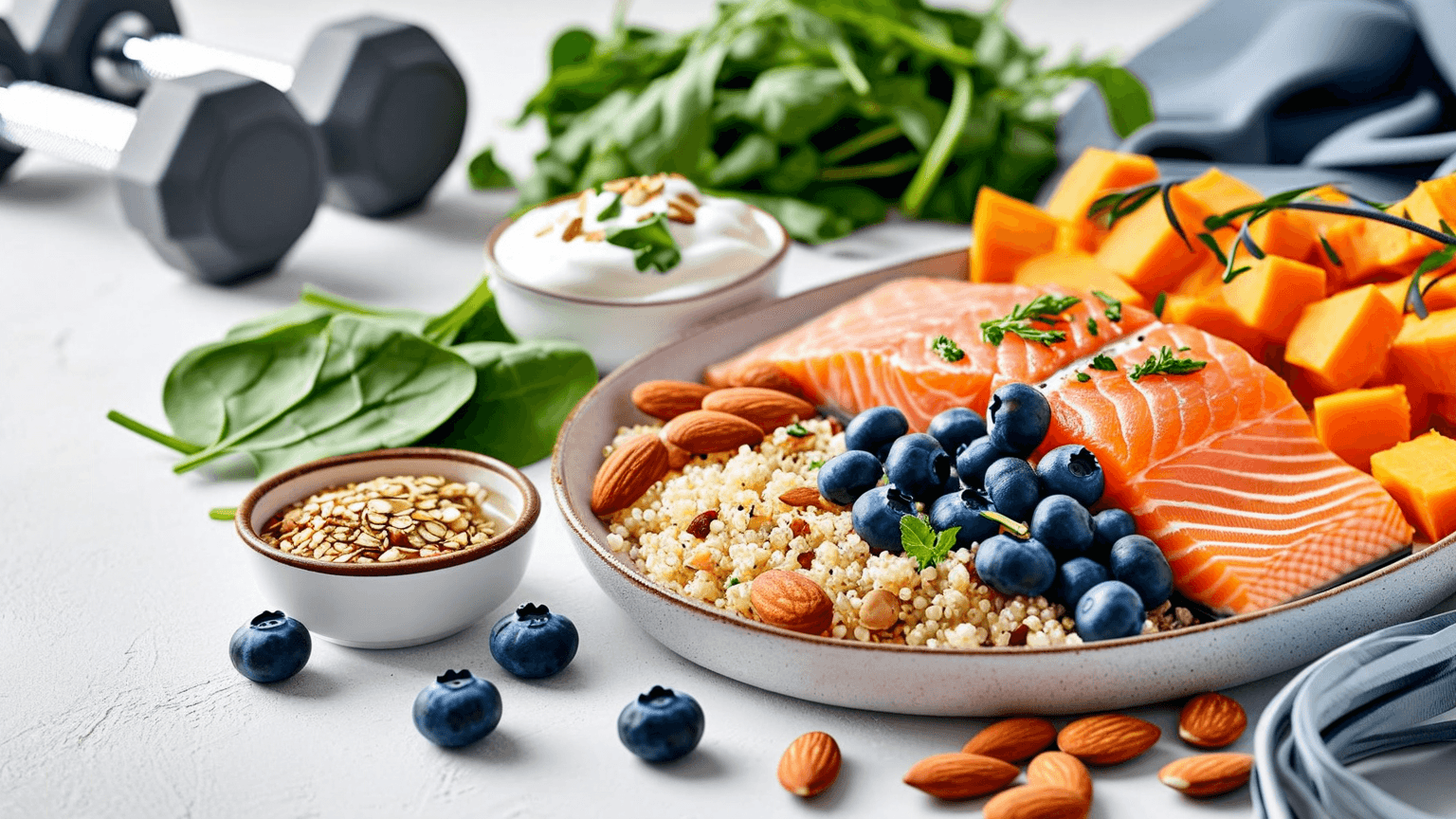Nutrition Tips for Beginners That Actually Work Without Confusing Science
Starting your nutrition journey shouldn't feel like decoding a chemistry textbook. While the internet overflows with complex meal plans and contradictory advice, the truth is that effective nutrition comes down to simple, sustainable principles that anyone can follow.
These beginner-friendly nutrition tips focus on practical changes you can implement today, without needing a degree in biochemistry or spending hours meal prepping.
Start With Your Plate, Not Your Pantry
The easiest way to improve your nutrition is to visualize your ideal plate before you even think about shopping. This simple mental framework eliminates guesswork and creates consistent results.
Fill half your plate with colorful vegetables and fruits. These provide essential vitamins, minerals, and fiber that support every function in your body. The more colors you include, the wider variety of nutrients you'll consume.
Reserve one quarter for lean protein sources like chicken, fish, beans, or tofu. Protein helps maintain muscle mass, keeps you satisfied longer, and supports immune function.
Use the remaining quarter for whole grains or starchy vegetables like quinoa, brown rice, or sweet potatoes. These provide sustained energy and important B vitamins.
Master the Art of Smart Snacking
Snacking gets a bad reputation, but strategic snacking can actually stabilize your energy levels and prevent overeating at meals. The key lies in choosing combinations that satisfy both your taste buds and nutritional needs.
Pair protein with fiber for maximum satisfaction. Try apple slices with almond butter, Greek yogurt with berries, or hummus with vegetable sticks. This combination slows digestion and prevents blood sugar spikes.
Keep emergency snacks visible and convenient. When healthy options are easier to grab than processed alternatives, you'll naturally make better choices. Stock your desk drawer, car, and bag with nuts, seeds, or whole grain crackers.
Time your snacks strategically. Eating a small snack 2-3 hours after meals prevents excessive hunger that leads to poor dinner choices.
Hydration Habits That Transform Energy Levels
Proper hydration affects everything from brain function to digestion, yet most people chronically under-drink water. Simple hydration strategies can dramatically improve how you feel throughout the day.
Start each morning with a large glass of water before coffee or breakfast. Your body loses significant water overnight through breathing and metabolism, so morning hydration jumpstarts your system.
Use the color test for hydration status. Pale yellow urine indicates good hydration, while dark yellow suggests you need more fluids. This simple visual cue eliminates guesswork about your hydration needs.
Flavor your water naturally if plain water feels boring. Add cucumber slices, lemon wedges, or fresh mint to make hydration more appealing without added sugars or artificial ingredients.
Simple Meal Prep Without the Overwhelm
Meal preparation doesn't require spending entire Sundays in the kitchen or investing in dozens of containers. Effective meal prep focuses on preparing components that mix and match throughout the week.
Cook proteins in batches. Grill several chicken breasts, bake a sheet pan of salmon, or prepare a large pot of beans. These protein bases work in salads, grain bowls, or quick stir-fries.
Wash and chop vegetables immediately after grocery shopping. Pre-cut vegetables eliminate the biggest barrier to healthy eating during busy weekdays. Store them in clear containers at eye level in your refrigerator.
Prepare one-pot meals that improve with time. Soups, stews, and grain-based salads actually taste better after flavors meld overnight, making them perfect for batch cooking.
Reading Labels Like a Nutrition Detective
Food labels contain valuable information, but marketing claims can mislead even well-intentioned shoppers. Learning to decode labels quickly separates truly nutritious foods from clever marketing.
Check the ingredient list first, not the nutrition facts. Ingredients appear in order of quantity, so the first few items make up most of the product. Choose foods where you recognize and can pronounce the main ingredients.
Ignore front-of-package claims like "natural" or "made with real fruit." These terms have loose regulations and often mask highly processed products. Focus on the actual ingredient list and nutrition facts instead.
Look for hidden sugars under different names. Manufacturers use terms like "evaporated cane juice," "brown rice syrup," or "fruit concentrate" to disguise added sugars. If a product contains multiple sugar sources, choose an alternative.
Building Sustainable Eating Patterns
Sustainable nutrition changes happen gradually through habit formation, not dramatic overhauls that burn out within weeks. Focus on building systems that support long-term success rather than short-term perfection.
Implement the "one change at a time" rule. Master drinking more water before tackling meal planning. Establish a consistent breakfast routine before overhauling your entire diet. This approach prevents overwhelm and builds confidence.
Plan for imperfection with the 80/20 approach. Aim for nutritious choices 80% of the time, allowing flexibility for social events, travel, or simple cravings. This balance prevents the all-or-nothing mentality that derails many nutrition efforts.
Create environmental cues that support your goals. Keep a water bottle visible on your desk, store fruits at eye level, and place unhealthy snacks in hard-to-reach locations. Small environmental changes create big behavioral shifts.
Budget-Friendly Nutrition That Doesn't Compromise Quality
Healthy eating doesn't require expensive superfoods or specialty ingredients. Strategic shopping and cooking techniques make nutritious meals accessible regardless of budget constraints.
Buy frozen vegetables and fruits when fresh options exceed your budget. Frozen produce is picked at peak ripeness and often contains more nutrients than fresh items that traveled long distances or sat in storage.
Embrace plant-based proteins like beans, lentils, and eggs. These options cost significantly less than meat while providing complete nutrition. A can of beans costs under a dollar and provides multiple servings of protein and fiber.
Shop seasonal produce for maximum value and flavor. Seasonal fruits and vegetables cost less and taste better than out-of-season alternatives. Learn what grows in your area during different months to plan accordingly.
Cook larger batches and freeze portions. Making double recipes and freezing half creates homemade convenience foods that cost less than store-bought alternatives while controlling ingredients and sodium levels.
Common Beginner Mistakes to Avoid
New nutrition enthusiasts often make predictable mistakes that create frustration and derail progress. Recognizing these common pitfalls helps you navigate your journey more smoothly.
Don't eliminate entire food groups unless medically necessary. Extreme restrictions often lead to cravings, binge episodes, and nutritional deficiencies. Instead, focus on adding nutritious foods rather than removing everything you enjoy.
Avoid comparing your eating habits to social media influencers or friends with different lifestyles. Your nutrition needs depend on your activity level, health status, preferences, and schedule. What works for others may not suit your situation.
Stop expecting immediate dramatic results. Nutrition changes create gradual improvements in energy, mood, and health markers over weeks and months, not days. Trust the process and focus on consistency rather than perfection.
Don't overcomplicate simple concepts with unnecessary supplements or exotic ingredients. Basic whole foods provide the foundation for excellent nutrition. Master the fundamentals before exploring advanced strategies.
Frequently Asked Questions
How long does it take to see results from better nutrition?
Most people notice improved energy levels within 1-2 weeks of consistent healthy eating. Digestive improvements often occur within days, while changes in weight, skin, and blood markers typically take 4-8 weeks to become apparent.
Do I need to count calories as a beginner?
Calorie counting isn't necessary for most beginners. Focus on eating whole foods, proper portions using the plate method, and listening to hunger cues. These strategies naturally regulate calorie intake without the stress of tracking numbers.
What's the best diet for beginners to follow?
The best diet is one you can maintain long-term. Rather than following restrictive named diets, focus on eating plenty of vegetables, adequate protein, whole grains, and healthy fats while staying hydrated and practicing portion control.
Should I take supplements as a nutrition beginner?
Most beginners should focus on food first before considering supplements. A varied diet of whole foods provides most essential nutrients. Consider a basic multivitamin if your diet lacks variety, but prioritize improving food choices over supplementation.
How do I handle social situations while improving my nutrition?
Plan ahead by eating a small healthy snack before social events to avoid arriving overly hungry. Focus on enjoying company rather than food, choose the healthiest available options, and remember that occasional indulgences won't derail your overall progress.
What should I do if I slip up and eat poorly?
Simply return to your healthy habits at the next meal without guilt or compensation behaviors. One poor food choice doesn't erase previous progress. Consistency over time matters more than perfection in individual moments.
Your Next Steps Forward
Transforming your nutrition doesn't require perfection or complicated strategies. Start with one simple change from this guide and practice it consistently for a week before adding another modification.
Remember that sustainable nutrition is about progress, not perfection. Small, consistent improvements compound over time to create significant health benefits. Choose the tip that resonates most with your current situation and begin implementing it today.
Your body will thank you for every positive choice you make, regardless of how small it might seem. Trust the process, be patient with yourself, and celebrate the small victories along your nutrition journey.
Related Topics
Explore more superfood insights and nutrition guidance.



